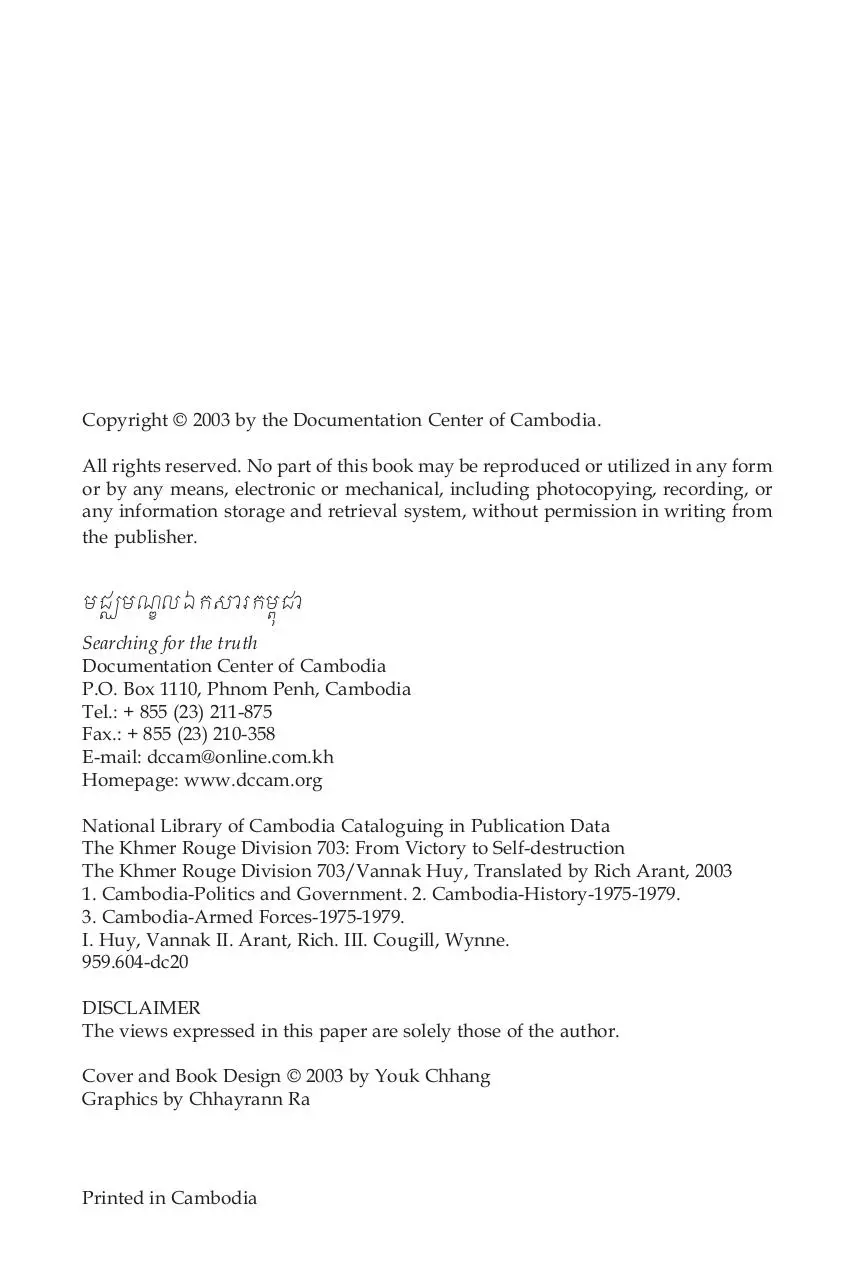division703 (PDF)
File information
Title: Division703.qxd
Author: DC-Cam
This PDF 1.5 document has been generated by PScript5.dll Version 5.2 / Acrobat Distiller 6.0 (Windows), and has been sent on pdf-archive.com on 28/04/2015 at 19:43, from IP address 42.115.x.x.
The current document download page has been viewed 888 times.
File size: 2.94 MB (216 pages).
Privacy: public file





File preview
FROM VICTORY TO SELF-DESTRUCTION
THE KHMER ROUGE DIVISION 703:
From Victory to Self-destruction
Huy Vannak
1
1
DIVISION 703
THE KHMER ROUGE DIVISION 703:
From Victory to Self-destruction
Huy Vannak
Copyright © 2003 by the Documentation Center of Cambodia.
All rights reserved. No part of this book may be reproduced or utilized in any form
or by any means, electronic or mechanical, including photocopying, recording, or
any information storage and retrieval system, without permission in writing from
the publisher.
mCÄmNÐlÉksarkm<úCa
Searching for the truth
Documentation Center of Cambodia
P.O. Box 1110, Phnom Penh, Cambodia
Tel.: + 855 (23) 211-875
Fax.: + 855 (23) 210-358
E-mail: dccam@online.com.kh
Homepage: www.dccam.org
National Library of Cambodia Cataloguing in Publication Data
The Khmer Rouge Division 703: From Victory to Self-destruction
The Khmer Rouge Division 703/Vannak Huy, Translated by Rich Arant, 2003
1. Cambodia-Politics and Government. 2. Cambodia-History-1975-1979.
3. Cambodia-Armed Forces-1975-1979.
I. Huy, Vannak II. Arant, Rich. III. Cougill, Wynne.
959.604-dc20
DISCLAIMER
The views expressed in this paper are solely those of the author.
Cover and Book Design © 2003 by Youk Chhang
Graphics by Chhayrann Ra
Printed in Cambodia
TABLE OF CONTENTS
Preface
Acknowledgements
Chapter 1. Introduction
Chapter 2. The Creation of the 703rd Division
Chapter 3. Drafting the Troops
Chapter 4. April 17, 1975: The Liberation of Phnom Penh
Chapter 5: Evacuating the People
Chapter 6. Sweeping the City Clean
Chapter 7. The Beginnings of the 703rd Division
Chapter 8. At the General Staff
Chapter 9. The 704th Special Forces Battalion
Chapter 10. Screening out Enemy Elements
Chapter 11. At Prey Sar Prison
Chapter 12. Office S-21: Tuol Sleng Prison
Chapter 13. The End of the Revolution
Chapter 14. Returning to the Past
1
5
10
21
25
32
35
42
57
61
67
76
109
118
Appendix A. The Research and Publication Projects of DC-Cam 127
Endnotes
Bibliography
135
175
About the Author
About the Translator and Editor
202
203
Region 25, Killing Site Map
of Democratic Kampuchea
Documentation Center of Cambodia
PREFACE
For many years, Cambodians have awaited justice for the
crimes committed by the Khmer Rouge, whose Democratic
Kampuchea regime governed the country between April 17, 1975
and January 6, 1979. Their abuses have hung like a dark shadow
over the lives of the victims and their families, and hindered our
nation's development.
Since the Documentation Center of Cambodia (DC-Cam) was
founded in January 1995, we have been deeply engaged in the
search for truth and accountability with respect to the Khmer Rouge
period. That process has often been very challenging. However, as a
result of the concerted efforts of Cambodians and concerned members of the international community, significant strides have been
made toward justice in Cambodia. At last, the prospect of a legal
accounting is clearly in sight.
On March 17, 2003, representatives from the United Nations
and Cambodian Government initialed a draft agreement that would
establish extraordinary chambers to hear cases against senior leaders of Democratic Kampuchea and those who were most responsible
for the crimes and serious violations while the regime held power.
On May 2, the Third Committee of the United Nations adopted the
draft agreement by consensus. On May 13, the UN's 191-member
General Assembly adopted by consensus a resolution containing the
draft agreement, which led to the agreement signed on June 6, 2003
by H.E. Mr. Hans Corell, United Nations Under-Secretary-General
for Legal Affairs and H.E. Mr. Sok An, Senior Minister, Minister in
Charge of the Office of the Council of Ministers, Chairman of the
Task Force for Cooperation with Foreign Legal Experts and
Preparation of the Proceedings for the Trial of Senior Khmer Rouge
Leaders of the Cambodian Government. The United States has
agreed to continue providing diplomatic support for the tribunal,
regardless of when it is set up. The Cambodian National Assembly
is widely expected to approve the draft in the very near future.
These developments mark a major step forward in the long
and difficult process of coping with Cambodia's tragic past. They
reflect the international and domestic will to put an end to impunity
and help Cambodians move toward a brighter and more prosperous
future. I welcome the progress achieved in recent months and
encourage continued cooperation between Cambodian and international authorities.
I wish to thank the many individuals and organizations that
have made this progress possible. Overcoming impunity requires
courage, dedication, and resources. Many governments and private
citizens have pushed for justice in Cambodia, and their efforts are
coming to fruition.
Many have chosen to support truth and accountability by
assisting DC-Cam as well, and we are profoundly grateful. Since
1995, DC-Cam has profited from a community of concerned volunteers, expert advisors, and international donors. We have also
reaped the benefits of collaboration with like-minded governmental
and non-governmental organizations, and villagers in Cambodia's
22 provinces that share our goal of achieving justice in Cambodia.
Without their generous financial, legal, historical, and technical support, the success of our work would have been imperiled.
The same will be true of the upcoming Khmer Rouge tribunal.
The agreement adopted by the United Nations Third Committee is
an important start, but it cannot guarantee the success of the tribunal in delivering the credible justice that Cambodians deserve.
Significant concerns remain about the political will needed to ensure
the tribunal's credibility. A successful tribunal will therefore require
the continued engagement of local and international citizens and
groups, via both direct participation and constructive criticism.
The same friends of justice who have helped the process reach
its current point must stay involved in the search for justice and see
it through to its conclusion. Financial, legal and technical support
will be imperative, as will the dissemination of the tribunal's activities to a national and worldwide audience. Governments, NGOs,
and individuals each have important skills to contribute. Together,
we can ensure that justice is done and that a Khmer Rouge tribunal
serves to advance reconciliation and the rule of law, in Cambodia
and abroad.
Finally, while a Khmer Rouge tribunal is an extremely important step in the search for justice, memory, and national reconciliation, it can never be sufficient. Dealing with the legacy of the Khmer
Rouge period is a long-term process in Cambodia. It involves reconstructing the economy, strengthening the organs of democracy, and
educating the younger generations. It also entails psychological
healing and forgiveness in local communities. A tribunal will support these processes, but it will not eliminate the need for them.
I wish to thank the many individuals who work every day to
bring about these aspects of reconciliation in Cambodia. We are
hopeful that concerned Cambodians and members of the international community will help the country heal and develop well into
the future.
Vannak Huy is a member of the Cambodian community who
has worked for the past three years to build a peaceful society in
our country. His monograph describes the lives of young Khmer
Rouge soldiers in Division 703. The surviving cadres of the Division
whom Vannak has interviewed see themselves as victims of
Democratic Kampuchea - the regime they served nearly a quarter
century ago. But in the eyes of many of the civilians who suffered
between April 17, 1975 and January 6, 1979, when nearly million
Cambodian people died of starvation, forced labor, and illness, or
were executed, they are not victims, but perpetrators.
However, without hearing the voices of these young comrades,
how can one know the whole truth? Listening to the other side of
the story, we can begin to eliminate the bitterness, hatred and intolerance that are the legacy of decades of civil war.
Youk Chhang, Director
Documentation Center of Cambodia
Phnom Penh, June 6, 2003
Download division703
division703.pdf (PDF, 2.94 MB)
Download PDF
Share this file on social networks
Link to this page
Permanent link
Use the permanent link to the download page to share your document on Facebook, Twitter, LinkedIn, or directly with a contact by e-Mail, Messenger, Whatsapp, Line..
Short link
Use the short link to share your document on Twitter or by text message (SMS)
HTML Code
Copy the following HTML code to share your document on a Website or Blog
QR Code to this page

This file has been shared publicly by a user of PDF Archive.
Document ID: 0000223321.